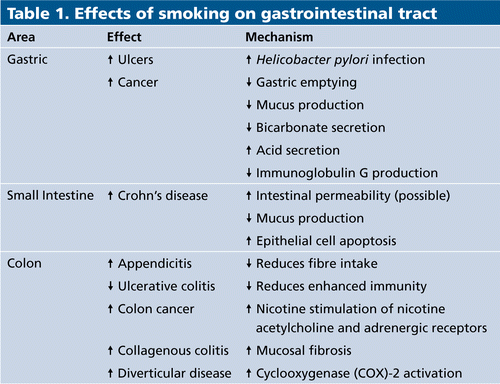Smoking is a well-known habit that has detrimental effects on various organs and systems in the human body. While the most commonly associated health risks of smoking include lung cancer, heart disease, and respiratory problems, it is important not to overlook the harmful impact it has on the gastrointestinal (GI) system. From the mouth to the colon, smoking can wreak havoc on the digestive system, leading to a wide range of conditions and complications.
MOUTH
Smoking has direct contact with the oral cavity and can lead to several adverse effects. The most evident consequence is the discoloration of teeth and bad breath, often referred to as smoker’s breath. Smoking can also cause gum disease, including gingivitis and periodontitis, due to reduced blood flow and compromised immune response. In severe cases, this can lead to tooth loss and the need for extensive dental treatments.
ESOPHAGUS (FOOD PIPE)
The nicotine and other harmful chemicals in tobacco smoke can weaken the lower esophageal sphincter (LES), a muscular ring that separates the esophagus from the stomach. When the LES is weakened, stomach acid can flow back into the esophagus, causing acid reflux and heartburn. Prolonged exposure to stomach acid can lead to more serious conditions such as gastroesophageal reflux disease (GERD) and esophageal cancer.
STOMACH
Smoking has been linked to an increased risk of developing peptic ulcers, which are painful sores that form in the lining of the stomach or duodenum (the first part of the small intestine). Smoking weakens the protective mucus lining of the stomach and reduces blood flow to the stomach, making it more susceptible to the damaging effects of stomach acid and certain bacteria like Helicobacter pylori.
PANCREAS
Chronic smoking has been shown to increase the risk of pancreatitis, an inflammation of the pancreas. Pancreatitis can cause severe abdominal pain, digestive problems, and even lead to pancreatic cancer. Smoking is also a known risk factor for pancreatic cancer, one of the deadliest forms of cancer with a very low survival rate.
LIVER
Smoking has been associated with an increased risk of liver disease, including non-alcoholic fatty liver disease (NAFLD) and liver cancer. Smoking can impair liver function and interfere with the body’s ability to process toxins.
INTESTINE
Smoking has been linked to an increased risk of colorectal cancer, which affects the colon or rectum.
PASSIVE SMOKER
It is worth noting that smoking not only affects the individual who smokes but also poses risks to those exposed to smoke. Passive smoke contains many of the same harmful chemicals and toxins as the smoke inhaled by smokers. Therefore, individuals who regularly breathe in Passive smoke may also be at an increased risk of developing GI-related conditions.
Quit Smoking
Quitting smoking is the best course of action to mitigate the risks and adverse effects on the gastrointestinal system. Research has shown that even after many years of smoking, quitting can significantly reduce the risk of developing GI-related diseases. It is important to seek support from healthcare professionals, use smoking cessation aids, and build a strong support system to increase the chances of successfully quitting.
CONCLUSION
Smoking has numerous detrimental effects on the gastrointestinal system. From oral health issues to an increased risk of cancers in various parts of the GI tract, the harmful chemicals in tobacco smoke wreak havoc on the digestive system. Quitting smoking is crucial for protecting and preserving the health of the gastrointestinal system, as well as reducing the risk of associated diseases and complications.

